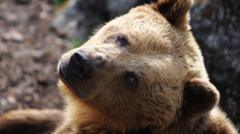The cabinet's decision came after a series of alarming incidents, including fatal attacks on humans. In light of what they describe as a bear overpopulation crisis, authorities plan to shoot up to 350 bears as a preventive measure. They justify the sale of the meat from the culled bears, asserting it would prevent waste and serve a rising demand.
State Minister Filip Kuffa emphasized the necessity of utilizing bear meat, declaring, "We will release every shot animal that meets certain conditions for consumption. Why? Because bear meat is edible." However, this move has faced opposition from conservationists, who argue it contradicts EU wildlife protection laws and undermines long-term solutions for coexistence.
The brown bear is categorized as a "near threatened" species by the World Conservation Union, and conservationists are urging the government to focus on preventive measures rather than culling. Critics argue that the culling scheme is a hasty response to complex human-wildlife conflict issues.
Amid these controversies, certain health regulations must be adhered to when selling bear meat in Slovakia, as it poses risks such as Trichinella infection. Health officials stress that robust safety measures must be taken to ensure the meat's safety for human consumption.
As Slovakia navigates this contentious situation, the future of bear conservation in the region hangs in the balance, prompting questions about the efficacy of culling as a solution to human-wildlife interactions.
State Minister Filip Kuffa emphasized the necessity of utilizing bear meat, declaring, "We will release every shot animal that meets certain conditions for consumption. Why? Because bear meat is edible." However, this move has faced opposition from conservationists, who argue it contradicts EU wildlife protection laws and undermines long-term solutions for coexistence.
The brown bear is categorized as a "near threatened" species by the World Conservation Union, and conservationists are urging the government to focus on preventive measures rather than culling. Critics argue that the culling scheme is a hasty response to complex human-wildlife conflict issues.
Amid these controversies, certain health regulations must be adhered to when selling bear meat in Slovakia, as it poses risks such as Trichinella infection. Health officials stress that robust safety measures must be taken to ensure the meat's safety for human consumption.
As Slovakia navigates this contentious situation, the future of bear conservation in the region hangs in the balance, prompting questions about the efficacy of culling as a solution to human-wildlife interactions.


















